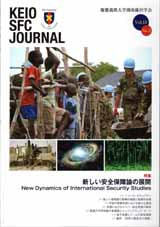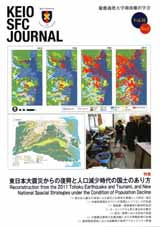- HOME
- KEIO SFC JOURNAL
- Vol.15 No.2

KEIO SFC JOURNAL Vol.15 No.2 New Dynamics of International Security Studies
published on 2016.03
SPECIAL FEATURE: New Dynamics of International Security Studies
-
Foreword
Download this article (PDF): SFCJ15-2-00.pdfKen Jimbo Associate Professor, Faculty of Policy Management, Keio University
-
Neuro Security -"Brain Supremacy" and "Mind Wars"
Takahiro Tsuchiya Researcher, The Institute of International Affairs / Senior Researcher, Keio Research Institute at SFC As research works in the field of the artificial intelligence (AI) and brain, neuro science and the cognitive psychology are developed, brain, mind and neuro of human caught a great deal of attention as "the 6th strategic territory" next to land, sea, air, space, and cyber. This article compares the concept of the "Brain Supremacy" of China to the "Mind Wars" and the "Neuro Wars" of the U.S., then analyzes their applications to the security and the military field of the brain and neuro science and the cognitive psychology studies, of which lead to the concept of "Neuro Security".
Download this article (PDF): SFCJ15-2-01.pdf -
Military Aspect and Strategic Effect of China's Reclamation in the South China Sea
Satoru Fuse Political Correspondent, TV-Asahi Ongoing land reclamation and construction of airstrips by China in the South China Sea (SCS) could expand both China's area of military operation and A2/AD capability of the People's Liberation Army. Moreover, it would provide China monitor and safeguard of sea line of communication (SLOC), a vital line for economy of Japan, South Korea and Taiwan. Such situation may reinforce China's political influence on America's allied nations and may even debilitate U.S. strategy toward Asia-Pacific region. Arguing Japan's military patrol in the SCS to counter China's reclamation, Japan is facing both operational and budgetary constraint. Therefore, Japan should deal with this new strategic issue based on quantitative assessment of national interest.
Download this article (PDF): SFCJ15-2-02.pdf
-
A New Tide in the Military Use of Space -The Significance of the Growing Use of Space in the U.S. Combat Operations
Yasuhito Fukushima Research Fellow, National Institute for Defense Studies, Ministry of Defense, Japan This paper explains the changing trend of the military use of space through the analysis of the U.S. combat operations since the 1990s. During the Gulf and the Iraq wars, the role of space systems in the U.S. combat operations has evolved from just an enhancer to an integral part of them. This growing use of space in the U.S. combat operations has created a new trend in the military use of space and other countries have started to follow the U.S. practice. In the longer term, such increasing dependence on space by the U.S. and its potential adversaries could encourage more active competitions for space control.
Download this article (PDF): SFCJ15-2-03.pdf -
Renewing Cyber-Deterrence Policy in the US -"Attribution" and "Resilience"
Takahisa Kawaguchi Senior Consultant, Tokio Marine & Nichido Risk Consulting Co., Ltd. / Senior Researcher, Keio Research Institute at SFC Can deterrence work in cyberspace? What kinds of situations does cyberdeterrence work in? This paper explores these questions, while describing the transition of" cyber-deterrence" concept in the US. The cyber-deterrent policy has been inconsistent in the past. It is because the U.S. government has attempted to renew the cyber-deterrence policy in response to changes in security environment and technical innovations. The renewing of cyber-deterrence policy has been driven by the inherent problems of cyberspace:" attribution" (identifying the cyber attackers) and "resilience" (restoring networks and data damaged by the cyberattacks), and they make cyber deterrence be more effective.
Download this article (PDF): SFCJ15-2-04.pdf -
An Expansion of UN Peace Operation and Engineering Peace
Tomoaki Honda Research Fellow, The Canon Institute for Global Studies Endless civil wars have emerged in the North Africa and Middle East after the era of the war on terror. The spread of collapsed states and failure of governance created leeway to radical groups such as Islamic States, which undermines the foundation of international order. Building stable and sustainable nation-state remains to be critically important in today's international security. What will be the role of United Nation's Peace Operation in leading the concept of peacebuilding? How will the military engage in the peacebuilding mission through the activities of contemporary UN Peace operations? This article describes the historical context of UN peace operations, and discusses today's challenges of United Nation's activities in conflicts. In order to analyze the role and function of military forces in the contemporary UN peacebuilding activities, this article highlights the concept of "Engineering Peace" which focuses the role of the military engineer in peace operation.
Download this article (PDF): SFCJ15-2-05.pdf -
The Changing Process of the Nuclear Non-proliferation Regime - Why Civilian Nuclear Cooperation with India Has Been Expanded ?
Shunsuke Kawaguchi Management Consultant, Japan Management Systems, Inc. The objective of this article is to deepen the understanding of the rise and fall of the nuclear non-proliferation regime, which has mainly been formed through NPT. First, this article presents 2 conditions for changing the regime, based on the Oran R. Young's international negotiation model. Then, it focuses on exceptional civilian nuclear cooperation with India. Looking at the process of the multilateral negotiation concerning India, it analyzes why the civilian nuclear cooperation with India has been expanded internationally. Finally, this article evaluates the nuclear cooperation in the light of nuclear non-proliferation.
Download this article (PDF): SFCJ15-2-06.pdf
-
Cry Havoc: The History of Military Dogs Edited by D. Nigel Allsopp, New Holland Publications, 2011
Reviewed by Tomoaki Honda Research Fellow, The Canon Institute for Global Studies
-
China's Hong Kong Policy after the First Taiwan Strait Crisis
Lian Shu Part-time lecturer, Faculty of Policy Management, Keio University Sino-British relations chilled after the first Taiwan Strait Crisis. The Chinese Government strongly protested to the British Government after the Kashmir Princess incident and the Kowloon Riot happened. But instead of interfering directly, China chose to solve the problems diplomatically. The essence of China's Hong Kong policy at the time was to get rid of the Kuomintang agents but to tolerate British rule in Hong Kong. Pragmatism played a very important role in Chinese policy towards Hong Kong in the 1950s.
Download this article (PDF): SFCJ15-2-08.pdf -
Debate on Solidarity and Universal Health Insurance Coverage in Cote d'Ivoire
Yu Abiko Doctoral Program, Education and Research Unit for Social and Human Sciences, University Félix Houphouët-Boigny, Côte d'Ivoire Health is one of the pillars of human security and national security, especially in developing countries. This research aims at clarifying factors hindering the implementation of universal health insurance coverage in Cote d'Ivoire, a key element for establishing a health care system accessible to all. A comprehensive analysis of Ivorian newspaper articles allows us to remark that the government categorically uses the term "national solidarity" in order to defend their Universal Medical Insurance project (AMU), instead of providing concrete answers to different issues raised by the opposition parties. This would imply that the AMU has failed because of a gap existing between the "national solidarity" brandished by the government and the reality of solidarity facing the Ivorian society.
Download this article (PDF): SFCJ15-2-09.pdf

